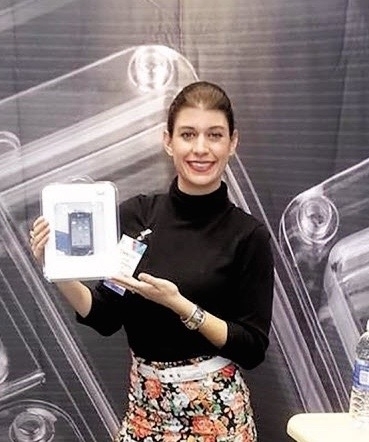July 22, 2016 Updated 7/22/2016
Email Print

Chandler Slavin Chandler Slavin, sustainability and marketing manager for Dordan Manufacturing Co. Inc., at a trade show.
Chandler Slavin draws on her experience as an environmentalist in her current position of sustainability and marketing manager for Dordan Manufacturing Co. Inc., a PET thermoformed packaging company in Woodstock, Ill., owned by her family.
“I’m very passionate about recycling,” Slavin said. She brought that passion to Dordan in 2009, after obtaining an arts degree from DePaul University. In the past several years, the 29-year-old has leveraged her environmental leanings into the business world. She has spread the recycling message in publications and blogs, and for a few years co-led Wal-Mart Canada’s PET subcommittee.
Her pet peeve is the shortfall in recycling of thermoformed PET packaging. Although that market segment has made gains, she has gone on the record as saying it hasn’t been enough.
One of her greatest achievements was participating in industry-wide discussions that convinced many that thermoformed PET containers are recyclable. About 60 percent of U.S. communities have access to facilities that can recycle the packaging, but economics are hampering wider adoption.
She has spread her message in published articles and continues to do so as a writing contributor and editorial board member for Plastics in Packaging magazine in Crawley, England. She also sits on the board of the Sustainable Manufacturer Network, based in Rockford, Ill.
“The economics of recycling are so complex, who is going to fund it?” she mused.
Slavin realized early in her business career that recycling issues were not simple and to a large degree the reality of recycling essentially comes down to economics. In today’s plastics market, virgin resins are more affordable. If consumers and brand owners resist passed-on costs of recycling, should municipalities foot the bill to help society meet its environmental targets?
This problem has plagued Slavin as she learned that in the business world people often do things for their own benefit and it’s tough to convince people to put aside their personal motivations in the cause of the common good.
After she started working at Dordan, she earned a certificate from the Chicago Management Institute at the University of Chicago’s Booth School of Business. Her interests have widened beyond the business world and now she is interested in how current global political turmoil and economic uncertainties affect business.
In the plastics sphere, Slavin has become interested in applications beyond Dordan’s core markets in packaging. She wants to learn more about non-packaging thermoformed products, like highly engineered dunnage or work-in progress trays for automation.
“This is a niche market and one that Dordan likes to play in, as retail packaging continues to be hard hit by the rise of e-commerce and changing consumer behaviors.”
Slavin’s father was her main mentor as she learned the ropes of the business world. She hopes to lead the family’s business in the long term when he is ready to retire. In this sense she may be atypical for a woman in the millennial generation, many of whom have not staked out specific career paths.
“I want to be the CEO and president of Dordan Manufacturing, but so does my brother, so maybe we can share the title” she joked. “Business is a marathon, not a sprint. If you are smart and work hard, you will be successful.”
Read a Viewpoint column on a study about women in manufacturing and find links to other profiles here.



























